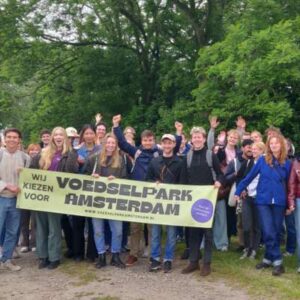
Onlangs bezocht een groep van ruim 100 Nederlandse en internationale studenten (UVA, VU en WUR) de Lutkemeerpolder. Zij kregen een rondleiding van onze eigen Iris, samen met Kate Brown (professor MIT) en Donovan Kaag (chef-kok en bewoner Nieuw-West). Sommigen van hen beschreven in een blog welke inzichten ze die ochtend hadden opgedaan, zoals Paulina Albrecht.
My name is Paulina and I was born and raised in a small town in Germany. I have been living in Amsterdam for almost three years and I am following a bachelors program in Communication Science at the UvA. During the last couple of months I have been doing my Minor in Global Water Challenges and in the following I will share my impressions of the
excursion to Lutkemeerpolder:
It was early thursday morning when I arrived at Lutkemeerpolder. When I stepped onto the farmland, I immediately had a very calm and happy feeling. I’d arrived a little late, so instead of being greeted by a large group of people, I was greeted by the smell of grass, the sound of bees and a few chickens running around. From the first second I felt completely immersed in this wonderful environment and I could feel that my thoughts of the morning and all the things I had in my mind, most of them related to stress and anxiety, were disappearing.
The first person I met was Iris. A very tough woman who explained the matter of the Lutkemeerpolder and the Voetselpark initiative with astonishing passion. I listened to her with great interest, learning about the history of the place, the values of the people who live there, and the courage of these people who are trying to resist the commercial plans that would destroy this paradise.
As we learned in the Spatial Implication of Environmental Change course, biodiverse ecosystems in or around cities play a very important role in mitigating the effects of climate change. Politicians together with communities should aim to increase the amount of green space instead of filling it with concrete. The Lutkemeerpolder is an area of 43 hectares of traditional ‘polder’ with parts of it under organic farming. This area contributes to temperature reduction, CO2 storage, flood prevention and the preservation of biodiversity. Several endangered bird species are sighted here every month. The food grown here is easily transported to consumers and markets in the cities. This saves a lot of fuel emissions from transport. Citizens and their children can also see how their food is produced and help with the harvest. This helps raise awareness around the food that we grow and eat, and connects us the the essentail resource we need for it, the soil.
During the course we also discussed how our economie’s dependence on so-called economic growth is one of the biggest driver of climate breakdown. The extraction of resources for economic development plays an important part of this. Especially when it happens in a rich, biodiverse ecosystem. The companies that will be built on these ‘greenfields’ are big polluters, contributing to greenhouse gas emissions. The Gemeente Amsterdam says it wants to lead in sustainability and circularity, but the companies that will build on the land go against this claim and perpetuate an obsolete form of development.
For me, this area is definitely worth fighting for, I may not be a specialist in soil resources and ecosystem science, but it is fairly easy to understand why this fertile piece of land is so worth protecting. It is the most fertile soil around Amsterdam and this area, used in a sustainable way for food production, and it could feed 100,000 households and create meaningful jobs. It’s great to have such an area so close to Amsterdam. The farm is different from the parks and other green areas we have in Amsterdam. The air is different, the sounds are different and it is such a peaceful place. It is a small paradise on Earth.
Coming here and getting to know the history, the people, their passions and what they fight for has inspired me a lot. There is so much more to this world than striving for the perfect academic degree, the perfect career and keeping yourself as busy as possible. The question is, what is perfect anyway? I suppose there is no single answer to that question. But one way to answer it, at least for me, is that perfection is peace and freedom like the feeling I had when I was in this beautiful setting just 30 minutes from the city centre. Instead of trying to collect my thoughts, I simply ignored them as I sat in the grass with my eyes closed. This has not happened to me in… weeks? Probably months.
Another special moment for me that I want to share was weeding one of the community gardens. I struck up an interesting conversation with people who had been on the same course as me for the past three months, but had never bothered to catch up in the hustle and bustle of the day. We talked about the beauty of the place and life in general, and I think we all enjoyed the moment so much. So close and yet so far away from all the noise in our daily lives.
All these little things made me realise how small we are in this fantastic yet terrifying world. We need to protect soil and nature to protect ourselves, so that we do not lose touch with where we all come from, to understand how we are able to live the way we do today, and to give back at least a little of what we have taken from the nature that sustains us.